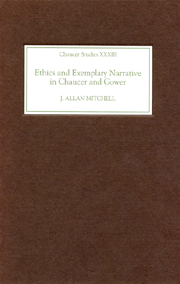Book contents
- Frontmatter
- Contents
- Acknowledgements
- Abbreviations
- Introduction
- 1 Reading for the Moral: Controversies and Trajectories
- 2 Rhetorical Reason: Cases, Conscience, and Circumstances
- 3 Gower For Example: Confessio Amantis and the Measure of the Case
- 4 All That Is Written For Our Doctrine: Proof, Remembrance, Conscience
- 5 Moral Chaucer: Ethics of Exemplarity in the Canterbury Tales
- 6 Pointing the Moral: The Friar, Summoner, and Pardoner's Satire
- 7 Griselda and the Question of Ethical Monstrosity
- Conclusion
- Bibliography
- Index
- CHAUCER STUDIES
Introduction
Published online by Cambridge University Press: 12 September 2012
- Frontmatter
- Contents
- Acknowledgements
- Abbreviations
- Introduction
- 1 Reading for the Moral: Controversies and Trajectories
- 2 Rhetorical Reason: Cases, Conscience, and Circumstances
- 3 Gower For Example: Confessio Amantis and the Measure of the Case
- 4 All That Is Written For Our Doctrine: Proof, Remembrance, Conscience
- 5 Moral Chaucer: Ethics of Exemplarity in the Canterbury Tales
- 6 Pointing the Moral: The Friar, Summoner, and Pardoner's Satire
- 7 Griselda and the Question of Ethical Monstrosity
- Conclusion
- Bibliography
- Index
- CHAUCER STUDIES
Summary
What is the good of examples in late medieval literature? That deceptively simple question first animated my study of two Middle English poets, Chaucer and Gower, and I think it serves as a useful point of entry into the larger topic of what I call the ethics of exemplarity. Ethics and exemplary narrative somehow interrelate. But before getting anywhere near answering the initial question, I want to begin with some remarks that serve to make my working assumptions and methodology explicit.
A main premise of this book is that the pragmatic orientation of medieval rhetoric forestalls generalities of the order we may be tempted to ponder in academic inquiry. One thing medieval writers ordinarily presuppose is a cultural context of reception in which examples are given and taken as precepts; examples are meant to move or improve you. Characteristically, medieval examples do not solicit static generalities (though they constantly seem to) so much as a particular and practical result, which is why, as should become clear, I take as my topic the ethics of exemplary narrative. Derrida for one has suggested that the example is just the sort of figure to issue in an ethical practice: “An example always carries beyond itself: it thereby opens up a testamentary dimension. The example is first of all for others, and beyond the self.” Given the “beyond” to which the example moves or projects itself, the speculative work of academic criticism can scarcely comprehend the full scope of what it means to respond ethically to medieval rhetoric.
- Type
- Chapter
- Information
- Publisher: Boydell & BrewerPrint publication year: 2004

